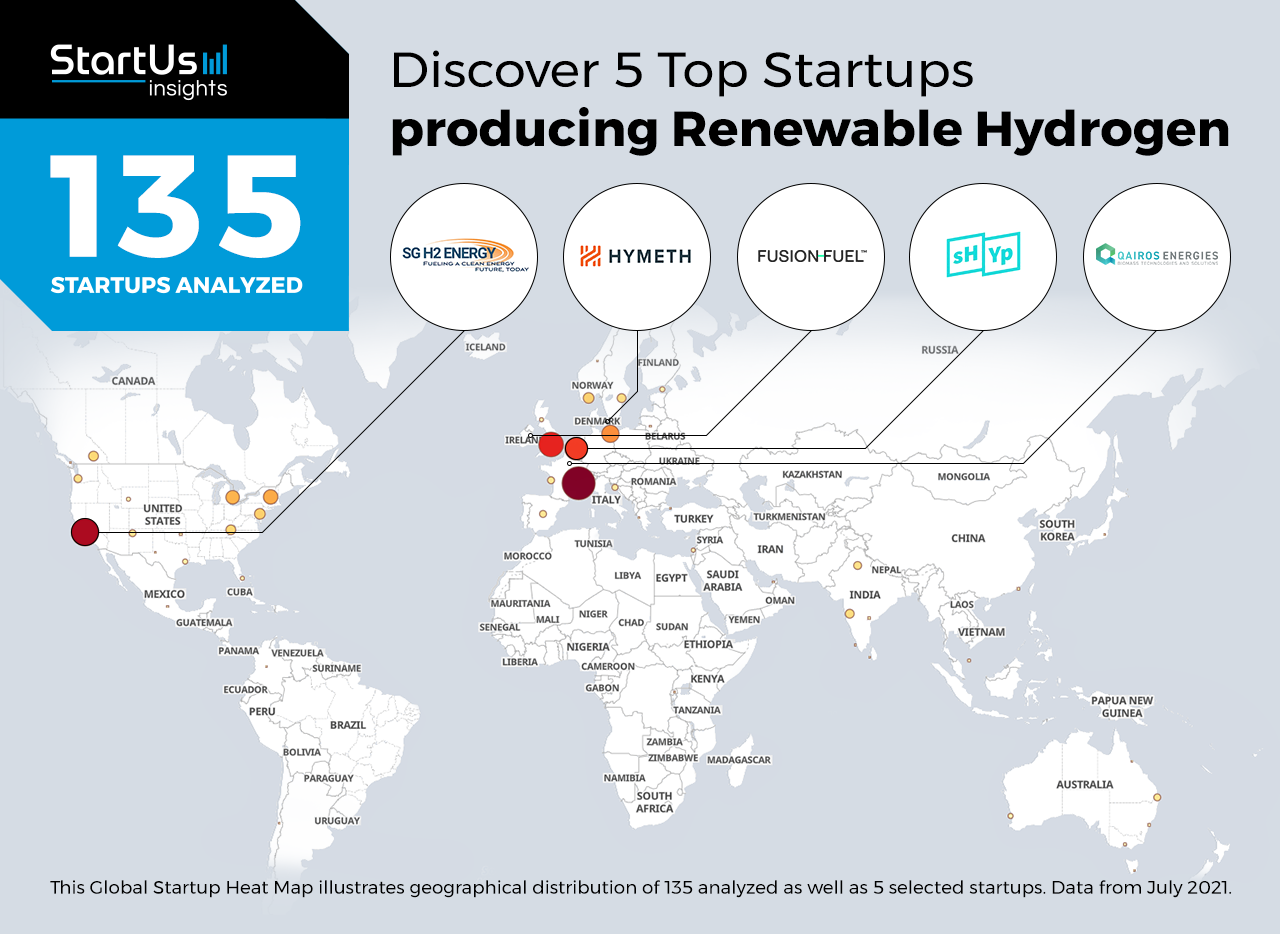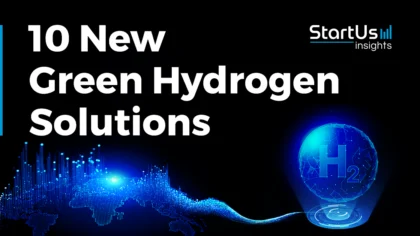Staying ahead of the technology curve means strengthening your competitive advantage. That is why we give you data-driven innovation insights into the energy industry. This time, you get to discover 5 hand-picked renewable hydrogen solutions.
Global Startup Heat Map highlights 5 Top Startups producing Renewable Hydrogen out of 135
The insights of this data-driven analysis are derived from the Big Data & Artificial Intelligence-powered StartUs Insights Discovery Platform, covering 2.093.000+ startups & scaleups globally. The platform gives you an exhaustive overview of emerging technologies & relevant startups within a specific field in just a few clicks.
The Global Startup Heat Map below reveals the distribution of the 135 exemplary startups & scaleups we analyzed for this research. Further, it highlights 5 energy startups that we hand-picked based on criteria such as founding year, location, funding raised, and more. You get to explore the solutions of these 5 startups & scaleups in this report. For insights on the other 130 renewable hydrogen solutions, get in touch.
sHYp produces Green Hydrogen from Seawater
Water is an ideal source for producing pure hydrogen by electrolysis due to its abundance and non-toxic nature. But existing electrolyzers operate only with pure water, which requires an additional purification unit. As a result, it consumes part of the hydrogen energy that the electrolyzer generates. This is why startups are developing techniques to extract hydrogen from readily available seawater.
sHYp is a UK-based startup that produces hydrogen from seawater by electrolysis. The startup uses a membrane-less electrolyzer that splits seawater into hydrogen and oxygen. The sHYp technology ensures that the by-products of seawater electrolysis are environmentally friendly and financially viable. The sHYp electrolyzer in offshore turbines uses seawater to convert surplus electricity into green hydrogen. In addition to hydrogen production, the system also produces magnesium and silica, captures carbon dioxide, and enables ballast water treatment.
SG H2 advances Plasma-enhanced Gasification
Hydrogen is the most abundant element on Earth due to its presence in hydrocarbons. This makes waste materials like paper, plastic, tires, and textile an untapped source of hydrogen. Startups are developing techniques to separate elemental hydrogen from hydrocarbon-based wastes. The benefits of such a separation technology are two-fold. In addition to creating green hydrogen, it also offers the opportunity to solve the waste crisis.
SG H2 is a US-based startup that uses its patented Solena Plasma Enhanced Gasification (SPEG) technology to extract hydrogen from waste. The high temperature of the plasma extracts the carbon from the waste and prevents the release of acidic gases and toxins. This catalytic reaction disintegrates waste into molecular compounds and, as the gases exit the reaction chamber, form hydrogen-rich syngas. The syngas then goes through a pressure swing absorber system resulting in highly pure hydrogen that is useful for fuel cell vehicles. SG H2’s process is efficient and has a lower carbon footprint than conventional hydrogen extraction processes.
Fusion Fuel develops Micro Electrolyzers
Green hydrogen is seen as one of the most promising alternatives to fossil fuels due to its high calorific value. But the technology for sustainable extraction of hydrogen still requires an industrial setup involving large infrastructure and investment. This is why energy startups and scaleups are developing techniques that make green hydrogen accessible and affordable.
Fusion Fuel is an Irish startup that designs and develops proprietary miniaturized polymer electrolyte membrane (PEM) electrolyzers to produce hydrogen at affordable costs. Hevo, the startup’s small, lightweight electrolyzer unit, features a miniaturized and decentralized design that enables mass production. Hevo-Solar is a combination of these electrolyzers with a high-efficiency concentrated photovoltaic solar module. This system utilizes both the electrical potential and thermal energy of the sun to generate hydrogen. This enables the small-scale production of renewable hydrogen without carbon emissions.
Qairos generates Biomass-derived Hydrogen
Biomass is useful for multiple applications including fuel, cosmetics, and plastics, with fuel being the most prominent. But all the fuel extracted from biomass is hydrocarbon-based and releases greenhouse gases. A large proportion of the combustion energy that such fuels generate is due to the hydrogen present in them. This is why startups are developing clean technologies for renewable hydrogen production.
French startup Qairos is a French startup that provides solutions to extract hydrogen from plant biomass. The startup uses the technique of pyrogasification that transforms solid biomass into a mixture of gases containing methane, hydrogen, and carbon dioxide. This mixture then passes through a separator that produces hydrogen that is useful in hydrogen-burning engines and fuel cells. To maintain the temperature in the gasification chamber, the system re-injects carbon dioxide. The solution provides a low-carbon fuel for heavy vehicles, trucks, and tractors, equipped with the appropriate engine, or fuel cell.
Hymeth builds a High-Efficiency Electrolyzer
The supply of renewable sources of energy like solar and wind face intermittent issues. So, electrolyzers producing green hydrogen need a good partial load range as well as a rapid response to manage fluctuations. This is why startups are developing electrolyzer units that produce stable green hydrogen. Such solutions aid the implementation of a power-to-hydrogen energy storage system and also serve as a source of hydrogen for industrial and mobility use cases.
Hymeth is a Danish startup that develops high-efficiency electrolyzer units for green hydrogen production. Hyaeon, the startup’s low-temperature high-pressure electrolyzer, operates at a higher efficiency than polymer electrolyte membrane (PEM) electrolyzers. Like PEM electrolyzers, Hyaeon features a compact design and a built-in cooling system that ensures the system operates in optimum temperature conditions for maximum efficiency. Hymeth also utilizes high-performing electrolyzer materials to maintain highly efficient green hydrogen production throughout the system’s lifetime.
Discover more Energy Startups
Energy startups such as the examples highlighted in this report focus on hydrogen generation, green hydrogen, as well as power to hydrogen. While all of these technologies play a major role in advancing the energy industry, they only represent the tip of the iceberg. To explore more energy technologies, simply get in touch to let us look into your areas of interest. For a more general overview, you can download our free Energy Innovation Report to save your time and improve strategic decision-making.









